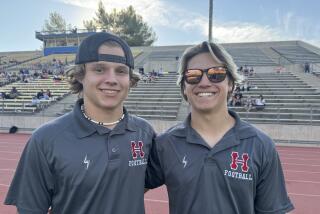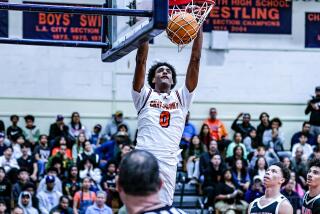Wolfe-Man on the Air : Articulate Chatsworth Senior Goes to Bat for Team on the Field and in Front of the Camera
- Share via
When Joel Wolfe speaks, people not only listen, they usually like what they hear. Wolfe, Chatsworth High’s third baseman exudes qualities rare for a 17-year-old. Articulate, thoughtful, intelligent, campus celebrity--Wolfe wears it well.
“I really feel good talking and I want to publicize our program and all the work the coaches have done,” he says by way of introduction.
When cable network ESPN visited Chatsworth this season to feature the Chancellors as the No. 1 high school team in the nation, Wolfe cleared his throat. Earlier in the season, he grabbed the ESPN spotlight when the Chancellors won the Colonial Baseball Classic in Orlando, Fla. Once again, Coach Bob Lofrano called upon his “media consultant” to pinch-speak.
Said Lofrano: “He sees the cameras rolling and he’s ready to go.”
Wolfe came through on cue, eloquently praising his teammates, coaches and community, much to the delight of all three. “He was awesome,” pitcher Derek Wallace said. “He really had some great lines. It was sweet .”
Ned Wolfe says his son has always possessed the gift of gab. In 1983, Wolfe, a precocious 13-year-old, shined in an interview in Taylor, Mich., during the Junior League World Series. “It was a pregame thing,” Ned Wolfe said. “They liked his interview and they broadcasted it over the loudspeaker at the field.”
Wolfe the chattiest guy in Chatsworth, is one of those guys you love to hate because he has everything going for him. Signed, sealed and soon to be delivered to UCLA on a full baseball scholarship, Wolfe, the Chancellors’ leadoff hitter, is staring at a future as bright and promising as a leadoff single.
“There is nothing that can match traveling and playing baseball, and I’d like to make a career out of that,” Wolfe unabashedly told ESPN in April. However, baseball is not all-consuming to Wolfe. “It’s important that everything is put into perspective. We have to remember that it is just a game and if we lose we can handle it,” he said. “But we feel like we’re doing some good for our school and our community.”
Lofrano, for one, is appreciative of Wolfe’s contribution.
“He’s had the best career of anyone I’ve coached,” said Lofrano, who has been at Chatsworth for 10 years. “He’s got the desire and natural ability to make baseball a career.”
Wolfe, a senior and three-year varsity starter, is Chatsworth’s career leader in league play in hits (61), doubles (11), runs batted in (40), stolen bases (35), runs (48) and at-bats (153). This year, he is batting .393 and has 29 RBIs--a remarkable sum for a leadoff hitter--and he shared the West Valley League’s most valuable player award with Adam Schulhofer of Canoga Park.
He is big (6 feet, 3 inches, 200 pounds) and fast (20 stolen bases)--”a complete package,” according to Lofrano--and has professional scouts foaming.
With every Chatsworth win this season, Wolfe has been on deck for worthwhile comment. The Chancellors (25-1) are one win away from their first 4-A City title game since 1983 as they await Tuesday’s 3 p.m. semifinal game against San Fernando at Cal State Northridge.
“I just can’t believe the way everything has broken not only my way, but the team’s way,” he said. “It’s unusual for things to go this well.”
As team captain, Wolfe has made things run smoother by providing needed on-field leadership at crucial moments. Several times, he has visited the pitcher to offer encouragement during a hectic late-inning mess.
“He’s the one guy I signal in to talk to the pitcher,” Lofrano said. “He’s like me: He keeps things in perspective and he doesn’t get excited.”
Wallace was voted MVP of the Florida tournament after pitching out of consecutive seventh-inning jams. In both games, a word from Wolfe was sufficient. “He’d say ‘These guys are no good and you’re better,’ ” Wallace said. “It helped a lot, got me going.”
Wolfe seems to handle everything as easily as a two-hopper off the grass. Not only did he coast past ESPN’s cameras, Wolfe coached his teammates in public relations.
“I have this video class at school, so I’ve had a lot of experience working behind and in front of the camera,” he said. “I was telling them don’t look at the camera when you talk and things like that. They wanted to talk to some of us and I just said, ‘I’ll go first.’ They started asking me questions and the words just floated out. Some people told me, ‘You should get a talent agent and go into broadcasting.’ ”
He concedes it is a possibility but not until his baseball career is finished. “Ever since I was a little kid I wanted to be a pro ballplayer,” he said. “I’d consider a career in broadcasting after a baseball career. There is a lot to say about the game and I’d like to be the one to say it.”
But college--and his parents’ wishes--comes first. “A college education is so heavily stressed in my family,” Wolfe said. “Both my parents are graduates.”
Ned Wolfe wants his son to go to college for at least three years before considering a baseball career. “I wouldn’t object if he wanted to sign as a junior,” he said. “Then he could always go back for the one year.”
Said Lofrano: “He would have to be overwhelmed by the offer to sign. He’s the kind of kid who is going to enjoy college--the football games, the basketball games.”
It seems that Wolfe enjoys everything. “I’m very happy,” he said. And he says he is not at all worried about having to make a choice between college or the pros.
“Any offer that I get would have to be for a very, very high sum of money or allow me to be able to go to college and play ball at the same time,” he said. “And I’ve told scouts that straight out. I don’t beat around the bush.”
Neither will Wolfe hesitate going to bat on the team’s behalf. When one too many home runs rattled an apartment window across the street from school during a recent practice, Wolfe was summoned to soothe the enraged tenants.
“I was over there collecting a couple of balls and two old ladies came out,” Wolfe said. “I thought they were going to jump me. They wanted to know why we couldn’t change the angle of the field, why we had to play year-round. I just told them, ‘Understand that we don’t mean to be malicious and we’ve been playing on this field for so long. If the ball comes over the fence, we can’t control it. And when it comes over just think, ‘Hey, we’re winning the game.’
“They didn’t really understand that.”
But it probably sounded good just to listen.
More to Read
Get our high school sports newsletter
Prep Rally is devoted to the SoCal high school sports experience, bringing you scores, stories and a behind-the-scenes look at what makes prep sports so popular.
You may occasionally receive promotional content from the Los Angeles Times.






